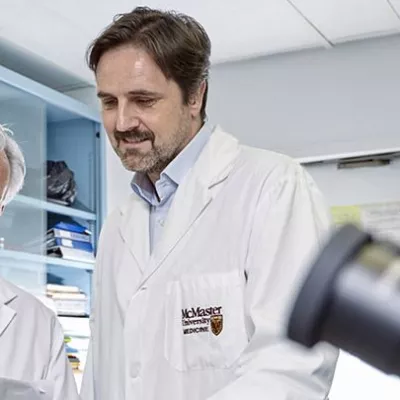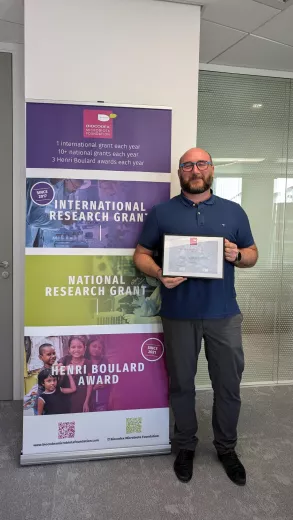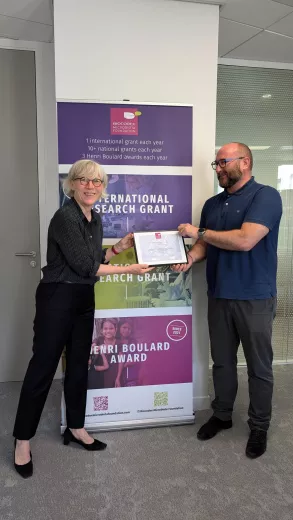
Project description
The concept of “Developmental Origins of Health and Disease (DOHD)”, popularized by the WHO under the name “the first 1000 days of life”, from the conception to the child's two years of age, is an integral part of current public health issues. This period is punctuated by extensive growth and constitutes a unique and critical window for the development of major physiological systems, determining future health status.
Numerous epidemiological and experimental observations have demonstrated that exposure of this critical window to chemical, nutritional, social or psychosocial disturbances such as chronic stress during pregnancy, results in a predisposition to the development of metabolic, neuropsychic, inflammatory or non-inflammatory pathologies such as irritable bowel syndrome (IBS). IBS is the most common gastrointestinal disorder with a global prevalence of 5% and affects twice women than men.
The notion of “functional disorder” results from the absence of quantifiable criteria in favor of an organic disorder. IBS, which is characterized by chronic visceral pain associated with transit disorders is define as an alteration of the microbiota-gut-brain axis. Recently, we demonstrated that prenatal stress induced visceral hypersensivity in mice. This hypersensitivity was correlated with taxonomic and functional dysbiosis of the microbiota.
Among the three stages, which are crucial for the establishment of the intestinal microbiota: primary colonization by the maternal vaginal microbiota, lactation and weaning, we highlighted the importance of lactation in PS-induced visceral sensitivity phenotype.
4 questions to Dr. Nicolas Cenac
You are the winner of the 2024 international call for research dedicated to the role of gut microbiota in the mechanism of pain.
Your project aims to decipher the mechanism by which milk of stressed mother could induce impaired microbiota implantation in the newborn, leading to the development of visceral pain in children and adults. Could you explain to us how this research is innovative?
Irritable bowel syndrome (IBS) is characterized by abdominal pain associated with transit disorders. Surveys on Western populations have estimated its prevalence between 4-10% in adolescents and adults. Epidemiological studies have suggested that environmental factors and, predominantly, stress could induce or aggravate IBS symptoms. In particular, perinatal stress, premature birth and low birth weight are significant risk factors for developing IBS in adulthood. In a recent study, we highlighted that prenatal stress in mice induces a taxonomic dysbiosis of the intestinal microbiota characterized by a decrease of Lactobacillus murinus abundance as well as a functional dysbiosis characterized by a decrease of bacterial analgesic GABA-lipopeptide concentration. In addition, we demonstrated in patients with IBS that the fecal concentration of GABA-lipopeptides was inversely correlated to the abdominal pain clinical score and the IBS-severity score scale (IBS-SSS), reinforcing the therapeutic target potential of GABA-lipopeptides and of bacteria producing them.
The mother serves as the primary source of microbes for her offspring, transmitting them during birth via the birth canal, and subsequently through skin-to-skin contact and breastfeeding. Maternal milk and colostrum are highly enriched in live microbes, metabolites, IgA antibodies, immune cells and cytokines, altogether shaping the microbiota of breastfed infants and their intestinal homeostasis. Among these three stages, which are crucial for the establishment of the intestinal microbiota, we focused on the role of lactation as, in mice, L. murinus is the most abundant bacteria in breast milk. In addition, we generated preliminary results demonstrating the importance of lactation in prenatal stress-induced visceral pain. We hypothesized that the maternal milk plays a crucial role in microbiota implantation leading, under stress condition, to taxonomic and functional microbiota dysbiosis associated with visceral pain. Our objectives are to quantify bacterial bioactive lipids in milk of mouse stressed during gestation as well as in human mother milk who delivered prematurely , and to determine the impact of these metabolites on intestinal homeostasis and visceral pain.
Is there a connection between functional microbiota dysbiosis and the development of visceral pain in babies and children?
The main aim of our project is to evaluate the connection between lactation and visceral pain in adulthood. Nevertheless, the quantification of the whole lipidome, including bacterial metabolites, of the maternal milk will open new perspectives on the direct role of lactation on visceral pain in babies and children.
Your project involves 3 different research teams. What are their respective roles?
Our team “Physiopathology of the gut-brain axis”, specialized on the study of visceral pain in animal and the identification and quantification of bioactive lipids, will be in charge of the lipidomic experiments and the animal study. The study in human will be performed under the responsibility of Pr. Pierrick Poisbeau and Pr. Pierre Kuhn (neonatology Dept., Hopital Universitaire de Strasbourg) from the team “Life adversity and pain”, who are particularly involved in chronic pain research. The goal of this team is to understand the links between adverse life events and the onset of a chronic pathology or symptoms such as pain. They explore in premature infants and neonates the mechanisms by which some factors may induce the development of subsequent pathologies
What potential impact could the findings of your study have on practice or everyday life?
The immediate impact of our work will be to highlight the necessity to manage stress in pregnant women and to consider stress as important as organic diseases such as infections during pregnancy. The second impact of our project could be the improvement of milk formula or the use of probiotics in lactating mothers to favor the implantation of beneficial bacteria in babies.
How do you see the positioning of the Biocodex Microbiota Foundation in research?
I am very grateful for receiving the Biocodex Microbiota Foundation international research grant. This grant will allow us to follow up on our recent findings on the link between prenatal stress and visceral pain. In addition, this grant will open a new collaboration between our fundamental Inserm research team and the clinic to transpose our discoveries in human health.
The aim of our project is to decipher the mechanism by which milk of stressed mother could impaired microbiota implantation leading to visceral pain in adults.
Gut Microbiota International Grant's winning projects

Microbiota-dependent regulation of bile acids in control of metabolic homeostasis (acronym: MRBM)


Bifidobacterium-derived peptides to fortify the intestinal mucosa in early life


Linking the early life resistome and microbiome maturation


Randomized controlled trial evaluating the effect of transplantation of fecal microbiota in children with autism spectrum disorders and gastrointestinal symptoms


Clostridium difficile-induced post-infectious Irritable Bowel Syndrome: Study of the mechanisms and treatments


Targeting gut microbial drug metabolism to enhance the treatment of Parkinson’s disease


A precision medicine approach to treat alcoholic hepatitis




